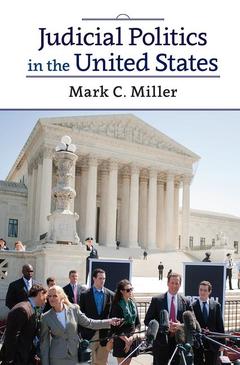Description
Judicial Politics in the United States
Author: Miller Mark C.
Language: English
Keywords
Circuit Court; Judicial Elections; Retention Elections; Supreme Court; Judicial Selection; Judicial Selection Process; Adversarial Legalism; State Supreme Courts; Judicial Selection System; Legislative Veto; State Judicial Elections; Home State Senators; State Supreme Court Elections; Comparative Judicial Politics; Solicitor General; Common Law Judicial System; President’s Pardon Power; Safford Unified School District; Judicial Retention Elections; Appellate Courts; Federal Sentencing Guidelines; Fec; President Obama’s Affordable Care; United States; Sentencing Guidelines
Publication date: 06-2019
· 15.2x22.9 cm · Hardback
Publication date: 08-2014
· 15.2x22.9 cm · Paperback
Description
/li>Contents
/li>Biography
/li>
Judicial Politics in the United States examines the role of courts as policymaking institutions and their interactions with the other branches of government and other political actors in the U.S. political system. Not only does this book cover the nuts and bolts of the functions, structures and processes of our courts and legal system, it goes beyond other judicial process books by exploring how the courts interact with executives, legislatures, and state and federal bureaucracies. It also includes a chapter devoted to the courts' interactions with interest groups, the media, and general public opinion and a chapter that looks at how American courts and judges interact with other judiciaries around the world.
Judicial Politics in the United States balances coverage of judicial processes with discussions of the courts' interactions with our larger political universe, making it an essential text for students of judicial politics.




